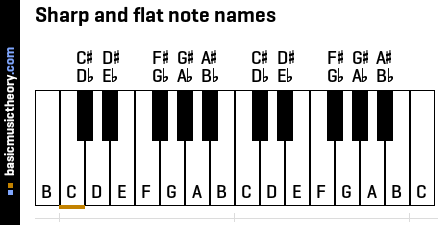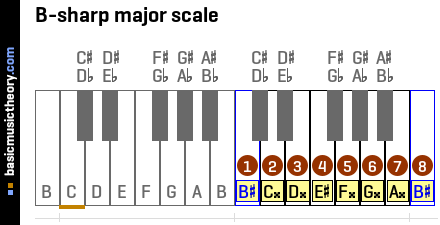B-sharp major key signature
The Solution below shows the B# major key signature on the treble clef and bass clef.
The Lesson steps then explain how to write the key signature using both clefs, including the display order and line / space staff positions of the notes, and the sharp / flat accidentals.
For a quick summary of this topic, have a look at Key signature.
| Key | C | C# | Db | D | D# | Eb | E | E# | Fb | F | F# | Gb | G | G# | Ab | A | A# | Bb | B | [B#] | Cb | All On 1 page |
|---|
Solution
1. B-sharp major key signature
The B-sharp major scale has 2 sharps, 5 double-sharps.
Warning: The B-sharp key is a theoretical major scale key.
This means:
> Its key signature would contain either double-sharps or double flats.
> It is rarely used in practice, because it is too complex to use.
> It is not on the Circle of fifths diagram, which contains the most commonly used keys.
> There is always an identical major scale that you can use in its place, which is on the Circle of 5ths.
> The C major scale sounds the same / contains the same note pitches, which are played in the same order (the scales are enharmonic), so it can be used as a direct replacement for the B-sharp major scale.
| No. | 1 | 2 | 3 | 4 | 5 | 6 | 7 | 8 |
|---|---|---|---|---|---|---|---|---|
| Note | B# | C## | D## | E# | F## | G## | A## | B# |
These note names are shown below on the treble clef followed by the bass clef.


 Bass Clef
Bass Clef
 Treble Clef
Treble Clef
Lesson steps
1. Piano key note names
The white keys are named using the alphabetic letters A, B, C, D, E, F, and G, which is a pattern that repeats up the piano keyboard.
Every white or black key could have a flat(b) or sharp(#) accidental name, depending on how that note is used. In a later step, if sharp or flat notes are used, the exact accidental names will be chosen.

The audio files below play every note shown on the piano above, so middle C (marked with an orange line at the bottom) is the 2nd note heard.
 Bass Clef
Bass Clef
 Treble Clef
Treble Clef
2. B-sharp major scale notes
The B-sharp major scale has 2 sharps, 5 double-sharps.
| No. | 1 | 2 | 3 | 4 | 5 | 6 | 7 | 8 |
|---|---|---|---|---|---|---|---|---|
| Note | B# | C## | D## | E# | F## | G## | A## | B# |

To understand why the B-sharp major scale has 2 sharps, 5 double-sharps, have a look at the B# major scale page, which shows how to identify the note positions and names for this scale.
Since this is a none-based key signature, the music theory rules for constructing key signatures containing nones are covered in the next step.
 Bass Clef
Bass Clef
 Treble Clef
Treble Clef
Related Keys and Topics
| Key | C | C# | Db | D | D# | Eb | E | E# | Fb | F | F# | Gb | G | G# | Ab | A | A# | Bb | B | [B#] | Cb | All On 1 page |
|---|